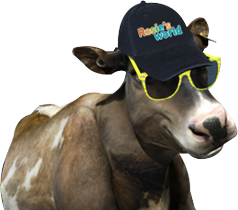Did you know that science and dairy farming go hand-in-hand?
Science and technology play a massive part in the Moo Zealand dairy sector, helping us lead the world! There have been heaps of discoveries so far and more are on the way. Science is used in very clever ways to help cows, farmers and our environment.
Check out the interesting science facts we've gathered for you and then watch the farmtastic moovie I made with Nate.
Kids have their parents’ genes!

Living things are made up of cells, and inside cells are genes. Genes are passed down from a mum and dad to their child, and genes are what make us who we are. They decide things like the colour of our eyes and hair.
Are calves and kids related?
Did you know that humans share genes with animals? The animal that we mostly closest share our genes with is the gorilla, a super close 98 per cent. Cows are a little more distant, sharing 80 per cent the same genes with you!
Tiny cells, big difference

A cow’s genes are quite important - they can determine how much milk the cow makes and how it processes nutrients. Some cows have genes that make them produce less methane than others. Methane is a gas that comes from cow burps and the less methane that goes into the air, the better for our planet. So farmers are now breeding more cows with the low-methane genes!
Special plant to help improve waterways?
Scientists are working with farmers to test a plant called plantain. When cows eat plantain, it works in three ways to stop nitrate going into our waterways. That’s good, because nitrate is a nutrient that can cause problems in rivers. Plantain is yummy for the cows, and healthier for our environment!
Reduce, reuse, recycle

When farmers clean out the milking shed, they reuse the water on their fields. Mixing water with manure helps the soil hold up to 20% more moisture. Saving water in this way is good for our environment.
Science costs, but it pays in the long run
Dairy farmers pay a set amount of money that’s put into research to find new ways to look after the environment. Just like you, farmers love nature and want to help keep our planet healthy.




